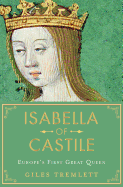
Giles Tremlett (Catherine of Aragon) sums up the theme of his accomplished biography of Isabella of Castile in the subtitle: Europe's First Great Queen. Isabella of Castile opens with a vivid set piece: 23-year-old Isabella marching through the streets of Segovia preceded by a knight carrying the royal sword. It was a symbol of power and of the will to use it. Isabella would prove to have both.
The odds were against her. When Isabella seized the throne after the death of her brother in December 1474, she inherited a weak monarchy and nobles accustomed to ruling their territories without deference to their feudal overlord. The powerful men who supported her questionable claim to the throne assumed her husband, Ferdinand of Aragon, would rule in her stead. Thanks to a prenuptial agreement, which she negotiated, Isabella governed Castile in her own right, with Ferdinand as a trusted partner. Together they transformed Castile and Aragon from a congeries of medieval feudatories into a modern state led by a powerful monarch. They also ended Spain's long history of relative religious tolerance, with the creation of the Spanish Inquisition and attacks on Muslims, Jews and Christians of Muslim and Jewish descent.
Tremlett paints a sympathetic picture of Isabella without whitewashing the fact that she was often ruthless and intolerant, with a sense of Realpolitik that rivaled that of Machiavelli. Isabella of Castile will appeal to readers who enjoyed Helen Castor's She-Wolves and Sarah Gristwood's Game of Queens. --Pamela Toler, blogging at History in the Margins

